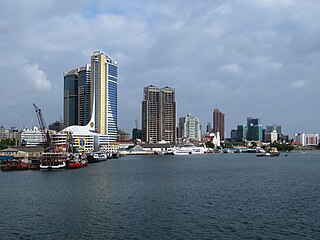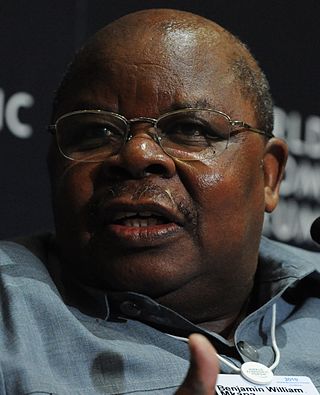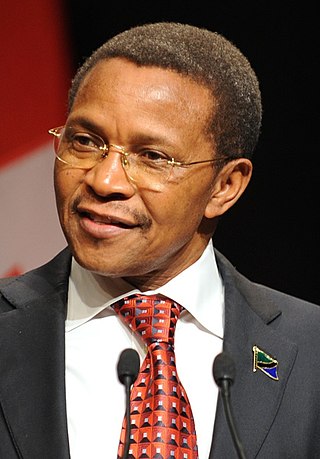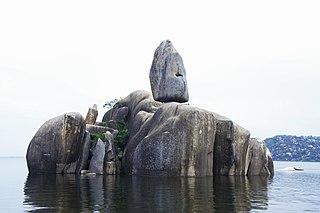
Dar es Salaam or commonly known as Dar, is the largest city and financial hub of Tanzania. It is also the capital of Dar es Salaam Region. With a population of over six million people, Dar is the largest city in East Africa and the seventh-largest in Africa. Located on the Swahili coast, Dar es Salaam is an important economic centre and is one of the fastest-growing cities in the world.

Tanzania, officially the United Republic of Tanzania, is a country in East Africa within the African Great Lakes region. It borders Uganda to the north; Kenya to the northeast; the Indian Ocean to the east; Mozambique and Malawi to the south; Zambia to the southwest; and Rwanda, Burundi, and the Democratic Republic of the Congo to the west. Mount Kilimanjaro, Africa's highest mountain, is in northeastern Tanzania. According to the United Nations, Tanzania has a population of 63.59 million, making it the most populous country located entirely south of the equator.

Tanzania comprises many lakes, national parks, and Africa's highest point, Mount Kilimanjaro. Northeast Tanzania is mountainous, while the central area is part of a large plateau covered in grasslands. The country also contains the southern portion of Lake Victoria on its northern border with Uganda and Kenya.

The economy of Tanzania is a lower-middle income economy that is overwhelmingly dependent on agriculture. Tanzania's economy has been transitioning from a command economy to a market economy since 1985. Although total GDP has increased since these reforms began, GDP per capita dropped sharply at first, and only exceeded the pre-transition figure in around 2007.

Zanzibar is an insular semi-autonomous province which united with Tanganyika in 1964 to form the United Republic of Tanzania. It is an archipelago in the Indian Ocean, 25–50 km (16–31 mi) off the coast of the mainland, and consists of many small islands and two large ones: Unguja and Pemba Island. The capital is Zanzibar City, located on the island of Unguja. Its historic centre, Stone Town, is a World Heritage Site.

Dodoma, officially Dodoma City, is the national capital of Tanzania and the capital of the Dodoma Region, with a population of 410,956. In 1974, the Tanzanian government announced that the capital would be moved to Dodoma for social and economic reasons and to centralise the capital within the country. It became the official capital in 1996. Much of the initial design did not come to fruition for a long time. As a result, Dar es Salaam remains the commercial capital of Tanzania and still retains the state house Ikulu, and a large number of government functions.

Benjamin William Mkapa was the third president of Tanzania, in office from 1995 to 2005. He was Chairman of the Revolutionary State Political Party.

Moshi is a municipality and the capital of Kilimanjaro region in the north eastern Tanzania. As of 2017, the municipality has an estimated population of 201,150 and a population density of 3,409 persons per km2. In the last official census of 2012, the municipality had a population of 184,292. The municipality is situated on the lower slopes of Mount Kilimanjaro, a dormant volcano that is the highest mountain in Africa. The name Moshi has been reported to refer to the smoke that emanates from the nearby mountain. The municipality covers about 59 square kilometres (23 sq mi) and is the smallest municipality in Tanzania by area.

Jakaya Mrisho Kikwete is a Tanzanian politician who was the fourth president of Tanzania, in office from 2005 to 2015. Prior to his election as president, he was the Minister for Foreign Affairs from 1995 to 2005 under his predecessor, Benjamin Mkapa. He also served as the chairperson of the African Union from 2008–2009 and the chairman of the Southern African Development Community Troika on Peace, Defence and Security from 2012–2013. Kikwete who is of Kwere heritage, was born and raised in Msoga, Chalinze District in Pwani Region and attended the university of Dar es Salaam.

Dodoma Region is one of Tanzania's 31 administrative regions. The regional capital is the city of Dodoma. The region is located in central Tanzania, it is bordered by Singida Region to the west; Manyara Region to the north; Iringa Region to the south; and Morogoro Region to the east. Dodoma Region hosts the nation's capital city with where the legislative assembly or Bunge is based. Dodoma Region also hosts one of the largest University in Tanzania, University of Dodoma. The regiom is sole home of the Tanzanian wine industry, which is the second largest wine industry on the continent after South Africa. According to the 2012 national census, the region had a population of 2,492,989.

Mwanza City, also known as Rock City to the residents, is a port city and capital of Mwanza Region on the southern shore of Lake Victoria in north-western Tanzania. With an urban population of 1,182,000 in 2021, it is Tanzania's second largest city, after Dar es Salaam. It is also the second largest city in the Lake Victoria basin after Kampala, Uganda and ahead of Kisumu, Kenya at least in population size. Within the East African community, Mwanza city is the fifth largest city after Dar, Nairobi, Mombasa, and Kampala. It is slightly ahead of Kigali, Kisumu, and Bujumbura in the population of city proper limits. However, in terms of infrastructure, Kigali and Kisumu cities are way ahead of Mwanza. Mwanza city is also the capital city of Mwanza Region, and is administratively divided into two municipal districts within that Region - Ilemela and Nyamagana.

The University of Dar es Salaam (UDSM) is a public university in Dar es Salaam, Tanzania. It was established in 1961 as an affiliate college of the University of London. The university became an affiliate of the University of East Africa (UEA) in 1963, shortly after Tanzania gained its independence from the United Kingdom. In 1970, UEA split into three independent universities: Makerere University in Uganda, the University of Nairobi in Kenya, and the University of Dar es Salaam.

Anna Kajumulo Tibaijuka is a Tanzanian politician and United Nations official. She was a Chama Cha Mapinduzi (CCM) Member of the National Assembly for Muleba South constituency during 2010 to 2020 and served as the Minister of Lands, Housing and Human Settlement Developments from 2010 to 2014.
Education in Tanzania is provided by both the public and private sectors, starting with pre-primary education, followed by primary, secondary ordinary, secondary advanced, and ideally, university level education. Free and accessible education is a human right in Tanzania. The Tanzanian government began to emphasize the importance of education shortly after its independence in 1961. Curriculum is standardized by level, and it is the basis for the national examinations. Achievement levels are important, yet there are various causes of children not receiving the education that they need, including the need to help families with work, poor accessibility, and a variety of learning disabilities. While there is a lack of resources for special needs education, Tanzania has committed to inclusive education and attention on disadvantaged learners, as pointed out in the 2006 Education Sector Review AIDE-MEMORE. The government's National Strategy for Growth and Reduction of Poverty in 2005 heavily emphasized on education and literacy.

The Open University of Tanzania (OUT) is a distance learning public university in Tanzania. It was established by an Act of Parliament No. 17 of 1992. It is a single mode institution offering certificate, diploma and degree courses through distance learning. Its headquarters is situated in Dar es Salaam, Tanzania, and conducts its operations through 30 Regional Centres and 70 Study Centres. The university has a capacity of approximately 70,000 students both local and international ones.

The Muslim University of Morogoro (MUM) is a private Islamic university in Morogoro, Tanzania. It was founded in 2004. The university has five departments: arts and humanity; Islamic studies; law and sharia; science; and business studies. MUM offers eight undergraduate degree programs.

Jumanne Abdallah Maghembe is a former Minister of Natural Resources and Tourism for the United Republic of Tanzania. He has been a Member of Parliament for Mwanga constituency since 2000 until 2020.

Kassim Majaliwa Majaliwa is a Tanzanian politician who has been Prime Minister of Tanzania since 2015. He was appointed by President John Magufuli after the 2015 general election. He is a member of the ruling Chama Cha Mapinduzi party and has been a Member of Parliament for Ruangwa constituency since 2010.
The COVID-19 pandemic in Tanzania is part of the ongoing worldwide pandemic of coronavirus disease 2019 caused by severe acute respiratory syndrome coronavirus 2. The COVID-19 pandemic was confirmed to have reached Tanzania in March 2020.

















